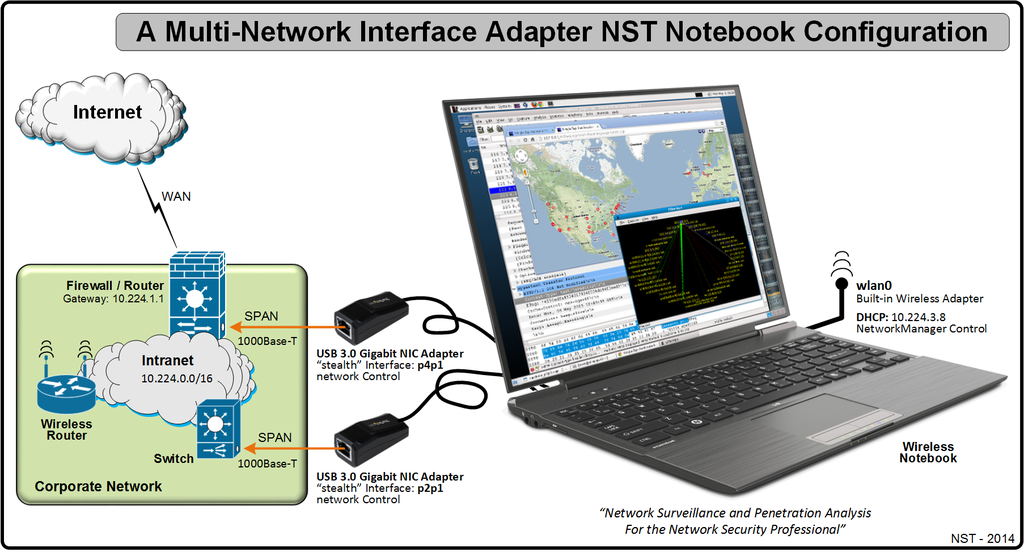Difference between revisions of "HowTo Setup A Wireless Notebook With Multiple Network Interface Adapters Using: "nstnetcfg""
(→Overview) |
(→Overview) |
||
| Line 6: | Line 6: | ||
[[File:Thunderbolt.png|frame|left|'''[[Feature Release Symbol | <center>NST 18<br /> SVN: 4575</center>]]''']]This page demonstrates how to setup networking with an NST ''wireless'' notebook that is configured with ''multiple'' network interface adapters for performing ''simultaneous'' network computing surveillance tasks. The NST script: "'''[http://nst.sourceforge.net/nst/docs/scripts/nstnetcfg.html nstnetcfg]'''" command line software utility was designed to make this task easy to accomplish using a combination of both the "'''[http://en.wikipedia.org/wiki/NetworkManager NetworkManager]'''" and "'''network'''" services. | [[File:Thunderbolt.png|frame|left|'''[[Feature Release Symbol | <center>NST 18<br /> SVN: 4575</center>]]''']]This page demonstrates how to setup networking with an NST ''wireless'' notebook that is configured with ''multiple'' network interface adapters for performing ''simultaneous'' network computing surveillance tasks. The NST script: "'''[http://nst.sourceforge.net/nst/docs/scripts/nstnetcfg.html nstnetcfg]'''" command line software utility was designed to make this task easy to accomplish using a combination of both the "'''[http://en.wikipedia.org/wiki/NetworkManager NetworkManager]'''" and "'''network'''" services. | ||
| − | The diagram below will be used as a reference for setting up a ''wireless'' notebook with | + | The diagram below will be used as a reference for setting up a ''wireless'' notebook with multiple network interface adapters using '''NST'''. The notebook is shown with '''[http://en.wikipedia.org/wiki/Universal_Serial_Bus#USB_3.0_.28Super_Speed.29 USB 3.0]''' Gigabit NIC attachments to the network infrastructure. The network security staff for fictitious company: "'''TxyCorp'''" would like to use NST for monitoring different network segments throughout their network. In particular, they would like to monitor traffic entering and leaving their corporation, web server traffic, all client electronic business transactions and remote traffic to and from their satellite offices. |
Revision as of 09:30, 7 May 2013
Contents
Overview
This page demonstrates how to setup networking with an NST wireless notebook that is configured with multiple network interface adapters for performing simultaneous network computing surveillance tasks. The NST script: "nstnetcfg" command line software utility was designed to make this task easy to accomplish using a combination of both the "NetworkManager" and "network" services.
The diagram below will be used as a reference for setting up a wireless notebook with multiple network interface adapters using NST. The notebook is shown with USB 3.0 Gigabit NIC attachments to the network infrastructure. The network security staff for fictitious company: "TxyCorp" would like to use NST for monitoring different network segments throughout their network. In particular, they would like to monitor traffic entering and leaving their corporation, web server traffic, all client electronic business transactions and remote traffic to and from their satellite offices.

